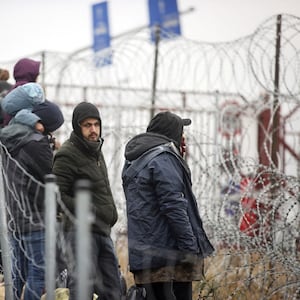The sense of desperation among the thousands of migrants still gathered on the Belarus side of its border with Poland is unmistakable. Children, wearing the same soiled clothes now for weeks, wail as their tired parents try to comfort them, undoubtedly realizing that this has all been a cruel joke and that there is no way they will cross into Europe.
Already horrific conditions in makeshift camps are now worse, muddy from rain and pepper-spray-laced water cannons shot at them by the Polish border guards in response to being assaulted with rocks. Tuesday marked the worst day for everyone involved—except the mastermind of it all, Belarusian President Aleksandr Lukashenko, and perhaps Russian President Vladimir Putin, who watch on as Europe shows its worst face when it comes to accepting migrants and refugees. There is no center for anyone to ask for asylum. They are denied before they can even ask for help.
The European Union continues to blame Lukashenko directly for the debacle that has turned mostly Iraqi migrants into pawns in what they call a “hybrid attack” on the 27-member bloc. Migrants interviewed by media at the border are starting to get it now, many realizing now that they are just political footballs being kicked around. One man caught in the mayhem told The New York Times he had no idea what to do now that he and his family had left everything behind. “We are just a stick that they are beating each other with,” he said. “We are in the middle of their fight.”
On Wednesday, Iraq’s foreign ministry confirmed that it had more than 325 evacuation requests from those who have decided to return. The first flight will depart Minsk for Baghdad via Erbil on Thursday. It is uncertain if those returning will face any retaliation. Other flights are expected in the coming days.
Calls for humanitarian aid to the more than 4,000 people stuck in ever-colder weather have been answered to some extent, with the Belarus Red Cross, backed by the military, hauling some of the most vulnerable to what it is calling “processing centers” housed in warehouses about a mile from the border, where they could at least dry off and warm up on Wednesday morning. CNN showed video from inside a center early Wednesday where Belarusian officials promise one warm meal a day, but where almost no one was wearing a mask, despite growing numbers of COVID cases and incredibly crowded conditions. More than a thousand people remain outside in the cold, hoping for a break—whether in the fence or by the Poles.

More than a dozen migrants are known to have died so far, mostly from hypothermia, undoubtedly made worse by being blasted with high-pressure water hoses. They are hastily buried in the forest or in small villages, their graves marked but likely soon forgotten. A Reuters journalist witnessed a makeshift funeral for a young man who died, with people using video calls to include his family back home in the somber service.
The EU has lauded Poland for protecting its border but has done little to help it and patience is also starting to wear thin within the bloc. The far-right among European leaders think Poland is doing a great job. The centrists, instead, are hoping something can be done to allow at least some migrants through.
Poland’s 15,000-strong border patrol has had its own problems with at least one soldier dying and several others now injured from rocks and other debris flying over the razor-wire fence.
Increasingly, Polish forces are trying their own diplomacy, now blasting messages in multiple languages to the migrants, telling them they have been “deceived” into thinking they can cross into Europe and that they should go home. Aid agencies say many—especially those with children—have started the journey back to Iraq, penniless and frustrated and facing an uncertain future upon their return.
“The Belarusian side is deliberately escalating the situation,” Polish Deputy Foreign Minister Marcin Przydacz said Tuesday. “The situation is unprecedented and unpredictable.”
Russia has been put in an increasingly uncomfortable situation with Putin really the last man standing on Lukashenko’s side, yet holding talks with European leaders to try some form of diplomacy. In a bilateral conversation with French President Emanuele Macron, Putin said he “emphasized the necessity of discussing the problems that had arisen directly between the leaderships of the EU countries and Belarus.” But he wasted no time noting what he considered “the extremely harsh treatment of refugees by Polish border guards.”







